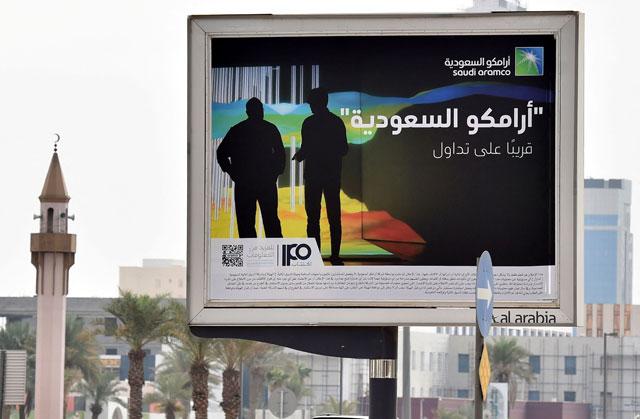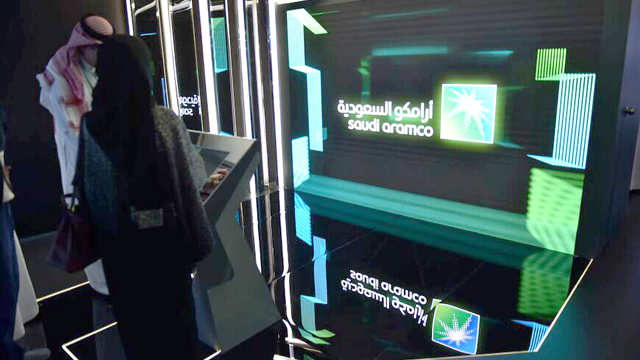You are here
Saudi Aramco unveils record profits
By AFP - Aug 14,2022 - Last updated at Aug 14,2022

In this file photo taken on November 11, 2019, a billboard displaying an advert for Aramco is pictured in the Saudi capital Riyadh. Oil giant Saudi Aramco unveiled record profits of $48.4 billion in the second quarter on Sunday after Russia's war in Ukraine and a post-pandemic surge in demand sent crude prices soaring (AFP photo)
RIYADH — Saudi Arabia ‘s oil company, Aramco, on Sunday unveiled record profits of $48.4 billion in the second quarter of 2022, after Russia's war in Ukraine and a post-pandemic surge in demand sent crude prices soaring.
Net income leapt 90 per cent year-on-year for the world's biggest oil producer, which clocked its second straight quarterly record after announcing $39.5 billion for Q1.
Aramco's massive Q2 windfall was the biggest quarterly adjusted profit of any listed company worldwide, according to Bloomberg.
The state-owned Saudi firm heads a list of oil majors raking in eye-watering sums after ExxonMobil, Chevron, Shell, TotalEnergies and Eni also revealed multi-billion-dollar profits in Q2.
"While global market volatility and economic uncertainty remain, events during the first half of this year support our view that ongoing investment in our industry is essential," said Aramco President and CEO Amin H. Nasser.
"In fact, we expect oil demand to continue to grow for the rest of the decade," he added.
Net income rose 22.7 per cent from Q1 in "strong market conditions", Aramco said. Half-year profits were $87.9 billion, up from $47.2 billion for the same period of 2021.
Aramco will pay an $18.8 billion dividend in Q3, the same as it paid in Q2. It "continues to work on increasing crude oil maximum sustainable capacity from 12 million barrels per day to 13 million by 2027", its earnings announcement said.
The quarterly profits, the highest since Aramco's record-breaking IPO in 2019, beat a company-compiled analyst forecast of $46.2 billion.
Aramco shares closed down 0.9 per cent at 40.5 riyals ($10.8) on the Saudi stock exchange. They are up 25 per cent this year.
'Crown jewel'
Aramco floated 1.7 per cent of its shares on the Saudi bourse in December 2019, generating $29.4 billion in the world's biggest initial public offering.
The "crown jewel" and leading source of income for the conservative kingdom temporarily supplanted Apple as the world's most valuable company in March. It now lies second in the list with a market valuation of $2.4 trillion.
Saudi Arabia has sought to open up and diversify its oil-reliant economy, especially since Mohammed Bin Salman's appointment as crown prince in 2017.
Despite raising production, Aramco has pledged to reach "operational net zero [carbon] emissions" by 2050. Carbon pollution is tallied in the country that uses the fuel, not where it is produced. Saudi Arabia’s gross domestic product jumped nearly 12 per cent in Q2 on the back of high oil prices, the government announced last month. Abu Dhabi-based energy expert Ibrahim Elghitany said the oil bonanza was a "golden opportunity" for the country."Saudi Arabia has recently achieved financial surpluses that it did not achieve during the last decade, which helps to provide financing for its development projects," Elghitany said.
Nasser said Aramco recovered quickly from a series of attacks by Yemen's Houthi rebels on its facilities earlier this year, including a dramatic strike in Jeddah that sent smoke billowing during a Formula One practice session in March.
"We were able to restore our production in all these facilities immediately. In a few weeks, all facilities were working and producing at full capacity," he told a media conference call.
Oil prices have dropped by $30 per barrel from a peak in June due to growing supplies, but remain close to $100.
The Organisation of the Petroleum Exporting Countries group of oil-producing countries has been gradually raising production, despite pressure from Western leaders including US President Joe Biden — who visited Saudi Arabia last month — to pump more.
British Prime Minister Boris Johnson has also visited Saudi Arabia since the Russian invasion in February.
High oil prices are contributing to the inflationary pain suffered by consumers worldwide.
Related Articles
RIYADH — Saudi Aramco on Thursday announced its first global investment in liquefied natural gas, part of a broader bid by the energy giant
RIYADH — Saudi Aramco said on Friday it had completed its purchase of a 10 per cent stake in a Chinese petrochemicals firm, part of an expan
RIYADH, Saudi Arabia — Energy giant Saudi Aramco reported a 15 per cent year-on-year drop in third quarter profit on Tuesday, citing low oil













